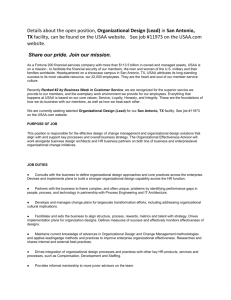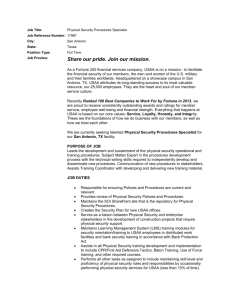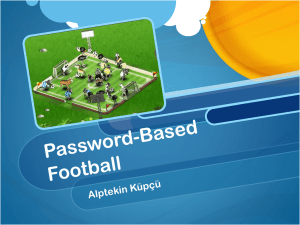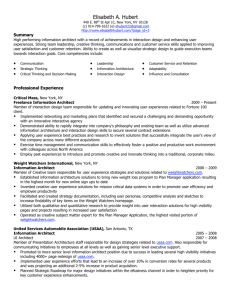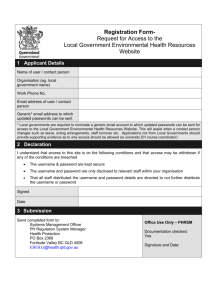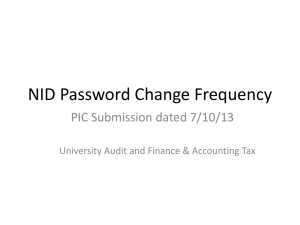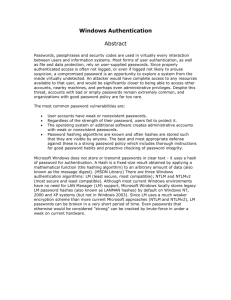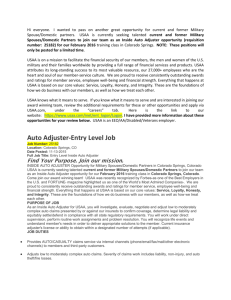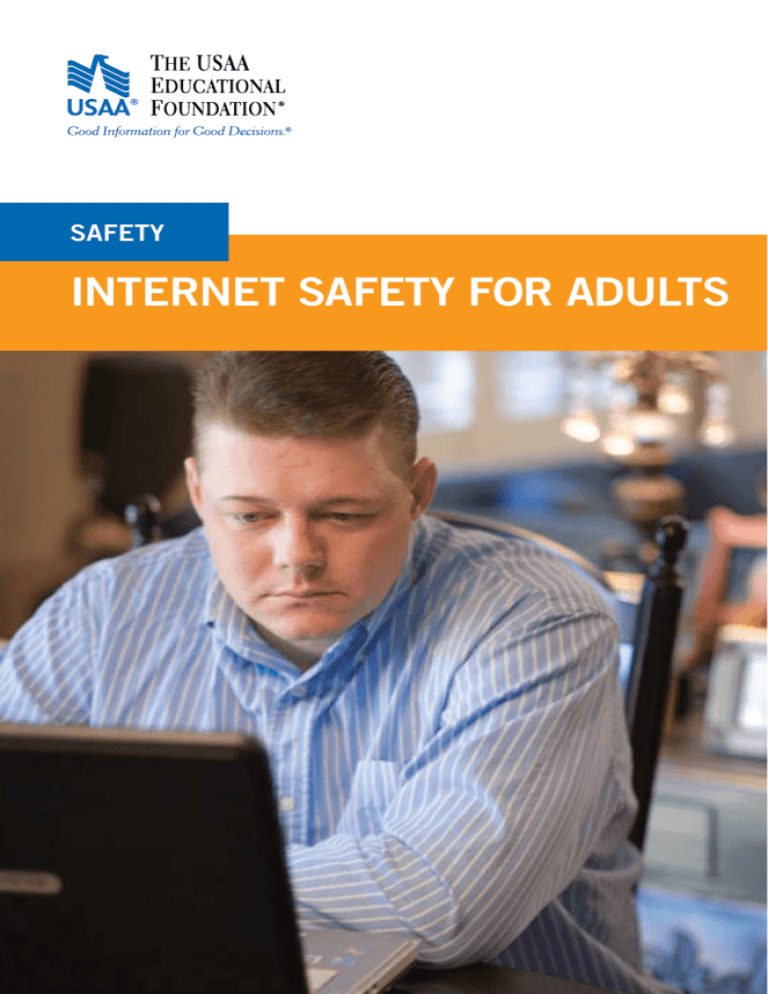
safety
internet safety for adults
our mission
The mission of The USAA
Educational Foundation is
to help consumers make
informed decisions by providing
information on financial
management, safety concerns
and significant life events.
This publication is not medical, legal, tax or investment advice. It is only a general overview of the subject presented.
The USAA Educational Foundation, a nonprofit organization, does not provide professional services for financial, accounting
or legal matters. Consult your tax and legal advisers regarding your specific situation. Information in this publication could be
time sensitive and may be outdated. The Foundation does not endorse or promote any commercial supplier, product or service.
Table of contents
March 2008
The Internet And You
2
Safeguarding Your Privacy 5
An introduction
Protecting your personal information
Social Networking
7
You, Your Children and the Internet
8
When Internet friends get too friendly
Protecting your children while they are online
The New Face Of The Childhood Bully 10
Addressing cyber-bullying
The internet and you
The Internet is everywhere today — at work, in your home, in coffeehouses,
in airports. Thanks to wireless technology, it follows you virtually anywhere.
The benefits of wireless technology are boundless. With a desktop or laptop
computer, or even with an Internet-enabled cellular phone, you can quickly
and easily go online to:
• Reference educational resources — Find a definition or a spelling,
conduct quick and easy research or take a Web-based college course
without ever leaving home. You can even check your children’s grades
online or find out if they turned in their homework.
• Communicate with family and friends — Keep in touch with loved ones
in any part of the world via e-mail, send video greetings and photos,
create a personal Web site, chat via instant messaging or talk live and
“face-to-face” via a Web camera.
• Search for information or entertainment — Find out where to catch the
latest film, buy tickets to a live performance, make reservations at your
favorite restaurant, search for and purchase a new suit or pair of shoes,
or participate in an online auction.
• Banking and e-commerce — Check balances in checking or savings
accounts, find out how your IRA is doing, transfer funds, buy and sell
stocks, and even deposit checks electronically.
There is no doubt that the Internet makes our lives easier. Activities and tasks
that once took hours to complete can be taken care of quickly and easily. But
as beneficial as the Internet might be, it is also a breeding ground for fraud,
identity theft, invasion of privacy and other cyber-crimes.
Use the Internet, but use it wisely. This publication gives you tools and tips that
will help you reap the benefits of electronic technology, while arming you with
the information you need to protect yourself and your family.
Words From The Wired World
The Internet has a language all its own. Here are some words to browse by.
Blog Or Web Log
A chronological, online diary of thoughts, ideas or events
taking place in the owner — or blogger’s — life.
Hyperlink
An online section of text or an image that, when clicked,
automatically connects an Internet user to related information or Web pages.
Search Engine
A program that searches for online Internet information
based on key words. The search produces a list of related
Web sites.
Password
A secret word used to confirm your identity when you log
on to a Web site.
Internet Service Provider Or ISP
A company that provides Internet access to consumers.
Virus A malicious program that can make your computer
“crash,” behave erratically or destroy files. Viruses are
often spread by e-mail or file-sharing programs.
Hacker
An individual who remotely accesses and tampers with
information on other individuals’ computers, either
legally or illegally.
Chat Rooms
Online gathering places where individuals with common
interests “meet” for discussions that appear almost immediately on the monitors of other chat participants.
Bulletin Boards
Electronic versions of the old-fashioned bulletin board
where messages are posted for others to see.
Filters
Programs that screen Web pages to determine whether
they should be displayed to users. For example, parents
can install filters that prohibit their children from
accessing pornographic or other objectionable content.
Profile
A short, succinct Internet “resume” that lets other Web
users know a little about you and your interests.
Creating Passwords
Passwords are used to access personal information stored on a Web site or on
your computer.
Although your password should be easy for you to remember, you will need to
change it often. Why? Because passwords obtained by fraudsters or thieves can
be used to gain access to your financial accounts or private information, or to
impersonate you when applying for credit, opening bank accounts or purchasing
products.
Protecting Your Passwords
• Create passwords with a combination of at least eight letters and
numbers, and use both upper- and lower-case letters. Longer passwords
are harder to decipher.
• Think of a phrase or sentence meaningful to you and easy to remember.
Then, take the first character from each word, alternate upper and lower
case and use some common letter-number substitutions.
• Avoid the use of personal information as part of your password. Do not
use your name, your pet or child’s name, your Social Security number,
or your current or former address.
• Stay away from number or letter patterns and sequences (for example,
“121212” or “abcdefg”).
• Change your password every 60 to 90 days.
• Vary your password — do not use the same one for every account or retail
site.
• Use a password that differs from your screen name.
• Do not store your password online.
Safeguarding Your Privacy
You can never be sure who you are chatting with online. The friendly fellow
movie fan or book lover in an online forum may actually be a clever criminal
looking for his next cyber-crime victim.
How can you have fun online while protecting yourself?
• Do not post the following information that will
identify you:
• Your full name.
• Your home address or phone number.
• Your Social Security number.
• Passwords.
• Credit card or bank account numbers.
• Names of family members or friends.
• Your workplace or favorite hangout.
• Clubs or organizations to which you belong.
• Historical information that could identify
your past homes.
• Do not use a nickname that can be used to
identify you (for example, “CharlestonLawyer,”
“CindyFromTulsa” or “KyWildcatMom”).
• Never share your account password.
From The FBI Files
FBI statistics show
that the average
victim of Internet
crime is a 30- to 40year-old man living
in California, Texas,
Florida or New York.
Individuals reported
an average dollar loss
of $724 in 2006.
Nearly 74 percent of
victims said they were
contacted through
e-mail, and 36
percent complained
of fraud that took
place via Web sites.
Source: FBI Crime
Complaint Center
Protect Your Computer System
• Consider using encryption to protect your personal information.
• Shut down your computer when it is not in use — especially in public
places, such as Internet cafes, coffeehouses or airports.
• Keep your antivirus programs, other software and operating systems
updated to protect against new attacks.
• Consider using a firewall on your system to protect against hackers
accessing your system remotely.
Staying Safe Using Blogs, Chat Rooms, E-Mail,
Internet Messaging And More
Face-to-face conversations are being supplanted by anonymous online discussions. That anonymity may compel some individuals to reveal too much about
their private lives, or to make hurtful comments or accusations they would never
make in person.
It is important to remember that the rules of behavior that apply in “real life”
apply to your “cyber life,” too.
• Do not say anything online that is cruel or may damage someone’s
reputation. Doing so puts you at risk of being accused of slander or
defamation, or may cause a dangerous escalation of hostilities.
• Never post anything that would cause you embarrassment or shame. The
Internet is the most public of forums — once you have posted a comment, a photo or a video, it cannot be erased or taken back. You cannot
control its duplication and it may be used against you.
• Remember that, once posted, the information can be seen by anyone
with a computer and an Internet connection: family and friends, employers or potential employers, admissions officers at schools you might like
to attend — even police and other law-enforcement authorities.
Social networking
Fast friendships are forged over the Internet – and there is no doubt that casual,
online conversations sometimes are the foundation of good, lasting relationships.
However, the anonymity of the Internet may mean that some individuals are not
who they seem to be.
If an online conversation makes you uncomfortable in any way, sign off immediately. And remember: Do not send photos of yourself or family members to Internet
acquaintances. Photos can be altered and sent to others, and elements in photos
— a landmark or a street name, for example — can be used to identify your
location.
Most importantly, do not go alone if you decide to take a friendship from the
cyber world to the real world. Select a public, safe meeting place and take along
a trusted friend. If your online friend is a trustworthy individual, he will understand and welcome your caution. If your plan for a public meeting is met with
objections, immediately terminate further conversation.
Be Smart, Be Safe: Meeting Someone You Met Online
Perhaps you have connected with someone you met online and want to spend
time together. Here is some basic safety information.
• People misrepresent themselves online. Often the lies are small and
harmless. But sometimes they are not. It is very easy for an individual
with criminal intentions to mislead potential victims over the Internet.
• Speak by phone before agreeing to a meeting. Often, hearing an
individual’s voice and engaging in verbal conversation is very revealing.
• Meet in a public place — a restaurant, a coffee shop or even a museum
— and take a friend. Make sure family members and other friends know
where you are going, who you are meeting, and how long you will be
gone. Check in with someone when you arrive, and arrange to call when
you are safely home.
• Watch your alcohol intake, and do not leave a drink unattended if you
step away from the table.
• Drive home alone. If you suspect you are being followed, drive to the
nearest police station or public location for help.
You, Your Children and the Internet
Protecting Your Children While They Are Online —
Education is Key
Kids and the Internet go hand-in-hand. In fact, your children probably know
more about Web navigation and computer programming than you do. However,
computer savvy does not mean computer safe. As a parent, it is your responsibility to know what your children are doing online and guard them against the
dangers that prey on unsuspecting minors. How can you do that?
• Set parameters. How many hours a day can they spend online? What
sites can they visit? Are chat rooms OK or off-limits? What about interactive games? Set rules and stand by them.
• Keep the family computer (or your child’s computer) in a busy area.
Children, especially young children, should access the Internet where
you can keep an eye on them. Monitor the sites they visit and consider
installing a software program that allows you to control their Web browsing. If your children have e-mail accounts, make sure you know their
passwords and randomly check messages.
• Educate yourself and your children. Follow news reports and conduct
research to find real-life examples of Internet predators. Remind them
that people they “meet” online are not always who or what they seem.
• Encourage your children to talk to you. Ask them to alert you if they
encounter someone or something online that makes them uncomfortable.
Remind them that you will not be angry; you love them and want to
protect them from real danger.
• Look for signs that your child might be at risk. If your child is secretive,
unusually quiet or spending too much time online, ask questions and be
supportive.
Internet Danger: Is Your Child At Risk?
You have read about it and heard it on the news:
Children everywhere are the victims of online predators.
Could it happen to your child? Yes, but knowing what to
look for will help ensure it does not. Here are things to
watch for.
• Uncharacteristic silence or withdrawal from the
family.
• Turning off the monitor or reducing a Web page
when you enter the room. If this is happening,
log on to your child’s computer and look for
evidence of inappropriate sites. Ask for expert
help, if necessary. “Google” your child’s name to
see if his personal information is on the Internet.
• Spending a lot of time online — especially at
night, when most computer predators are online,
too.
If Your Child Has
Been Targeted
By A Predator
Immediately contact
the National Center
for Missing &
Exploited Children
at cybertipline.com
if your child has:
• Received pornography.
• Been solicited.
• Received explicit
images from someone who knows he
is a minor.
• Your child is making or receiving telephone calls
to or from unrecognized numbers.
Remember: Talk to your child if you suspect
she is at risk, and monitor access to electronic
communications. It will be worth your time, because
communication is the key to keeping children safe.
10
The New Face Of The Childhood Bully
Internet bullying, known as
cyber-bullying,
takes place in
all communities
and at all income levels.
When you were a child, chances are you faced bullies
only in the schoolyard. Today’s bullies follow children
home — and even breach the safety of their homes
— by taking their taunts online.
Internet bullying, known as cyber-bullying, takes place
in all communities and at all income levels. Sometimes,
the bully is someone your child knows from school. But
all too often, the bully is an individual your child has
never met — perhaps someone she angered in a chat
room or on a gaming Web site.
Cyber-bullying can be more harmful and frightening
than schoolyard bullying, because it is very public (the
bully spreads hurtful comments or innuendo to many
people via the Internet, and others may join in). Plus,
the cruelty does not stop when your child walks in the
front door to your home.
If you suspect your child is the victim of an Internet
bully:
• Block the sender’s e-mail or Internet
Messaging (IM) account.
• Go online yourself to warn the bully that if the
behavior does not stop, you will inform his
parents, the Internet Service Provider (ISP) and
the appropriate law-enforcement authorities.
• Report the situation to the ISP.
• Urge your child to stay offline, if necessary.
• Seek legal guidance, if warranted.
11
Cell Phone Safety
Telephones with Internet capabilities are great for keeping in touch and especially for summoning help in the event of an emergency. Some of today’s cell
phones even have built-in Global Positioning Systems (GPS), that can pinpoint
your location if you are too sick or injured to place a call.
However, the phones that are so handy for communication can become tools for
stalkers and other predators. Do not share your telephone number with strangers
(ask for their numbers instead) and do not respond to suspicious Short Messaging Service (SMS) text messages received on your cell phone.
ADDITIONAL INFORMATION
1. onguardonline.gov
2. getnetwise.org
3. i-safe.org
4. netsmartz.org
5. mcgruff.org
6. staysafeonline.org
7. wiredsafety.org
12
notes
resources
13
The USAA Educational Foundation offers the following publications.
Managing Credit And Debt
(#501)
Making Your Home A Safer
Place (#531)
Basic Investing (#503)
Bicycle Safety (#542)
managing your Personal
Records (#506)
Installing Child Safety
Seats (#544)
Life Insurance (#507)
Health Insurance (#545)
Planning A Move (#509)
Helping Children Develop
Healthy Habits (#547)
Financing College (#513)
retirement planning in
your 20s and 30s (#516)
Keeping Your Child Safe
(#549)
identity theft (#520)
Family Values: Building
A Legacy (#562)
Making Money Work For You
(#523)
internet safety for teens
(#573)
Balancing Family And
Career (#529)
To order a free copy of any of these and other publications, visit
www.usaaedfoundation.org or call (800) 531-6196.
USAA is the sponsor of The USAA Educational Foundation.
The USAA Educational Foundation www.usaaedfoundation.org is a registered trademark of The USAA
Educational Foundation.
© The USAA Educational Foundation 2008. All rights reserved.
No part of this publication may be copied, reprinted or reproduced without the express written consent of
The USAA Educational Foundation, a nonprofit organization.
70572-0308
EDF-2008-649


